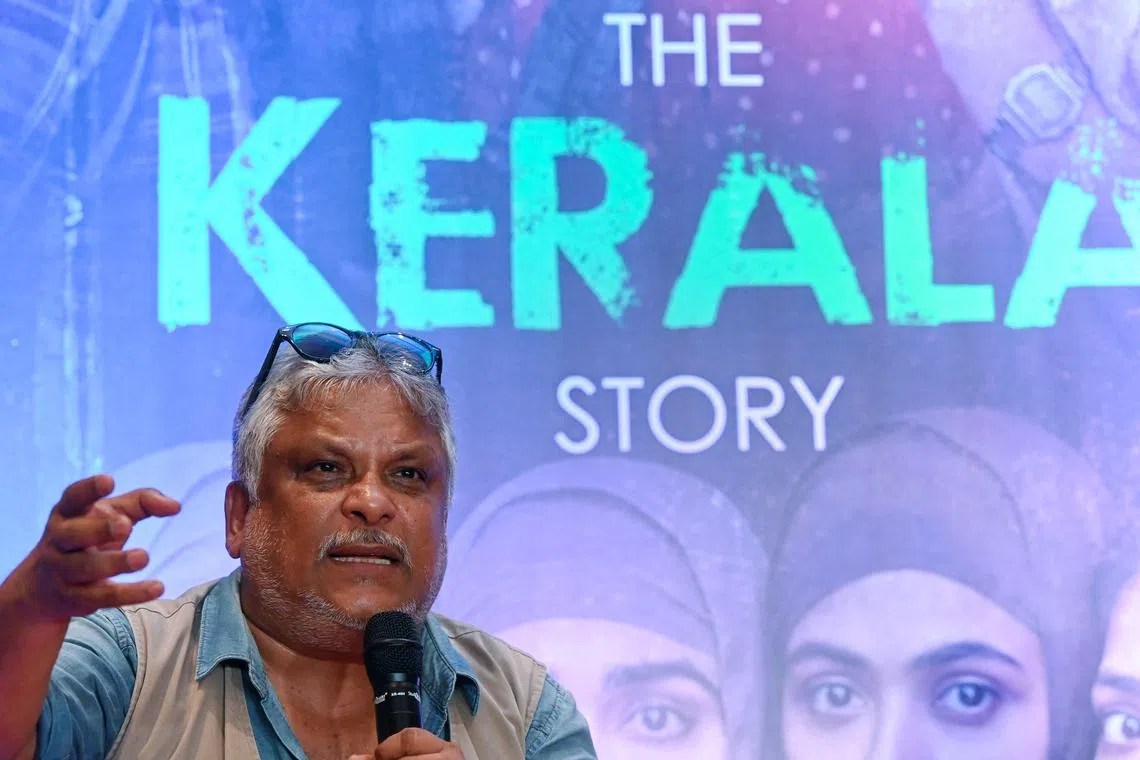Indian movies vilifying Muslims spark fear ahead of polls
Sign up now: Get ST's newsletters delivered to your inbox

Bollywood director Sudipto Sen suggests all political parties should take advantage of his film for political gain.
PHOTO: AFP
Follow topic:
MUMBAI – With free tickets and false claims, The Kerala Story is one of a slew of polarising films sparking concern that Bollywood is churning out cultural propaganda to bolster support for India’s ruling party ahead of elections.
The trailer for the anti-Muslim box office hit claims to depict “innocent girls trapped, transformed and trafficked for terror”, while declaring it was “inspired by many true stories”.
A fictitious tale of a Hindu woman who converts to Islam and then is radicalised, the movie is the second-highest-grossing Hindi film of 2023 so far.
Critics have accused it and other recent releases of peddling lies and stoking divisions, including by vilifying the Muslim minority, ahead of the 2024 national election.
“I would suggest all political parties... take advantage of my film... Use it for your political gain,” director Sudipto Sen said, in response to an AFP question about its political leanings.
The world’s largest democracy has a long history of film censorship, but detractors say the industry is increasingly pushing out films that share the ideology of Prime Minister Narendra Modi’s Hindu-nationalist government.
The mass appeal of cinema in India makes the medium an unrivalled means of reaching the public, said journalist and author Nilanjan Mukhopadhyay.
During Mr Modi’s tenure, movies have increasingly been used to spread divisive messages reinforcing prejudices shared by political leaders, Mr Mukhopadhyay said.
“The same thing is being done by these films, to take hatred to the people... to create prejudice against the religious minorities,” he added.
‘Medium of communication’
The release of The Kerala Story in May coincided with elections in the southern state of Karnataka.
The polls, hotly contested by Mr Modi’s Bharatiya Janata Party (BJP), triggered stone-throwing clashes in neighbouring Maharashtra state, where one person died.
Mr Modi endorsed the film during an election rally, while accusing the opposition Congress party of “supporting terrorism tendencies”. Critics said the low-budget movie taps so-called “love-jihad” conspiracies, where predatory Muslim men seduce Hindu women.
The film-makers have since retracted the false claim that 32,000 Hindu and Christian women from mixed-faith Kerala had been recruited by the Islamic State militant group.
BJP members organised free screenings of the movie that party spokesman Gopal Krishna Agarwal said were part of “a medium of communication” but not official policy.
“How do you communicate your ideology? How do you communicate the life and story of your leader and their work? This is the way we do it... People from the party do it on an individual basis,” Mr Agarwal said.
In a bid to encourage viewers, two BJP-led state governments slashed the tax on tickets.
The director said his film had “touched a chord” in India, which has one of the biggest Muslim populations worldwide – about 14 per cent of its 1.4 billion people.
“I believe in the power of truth, the truth which we said in the film, and this is what people want to see,” Mr Sen said.
His film is one of many shifting from Bollywood’s usual song-and-dance routines.
A string of recent military-themed movies has consisted of nationalistic, all-guns-blazing stories of heroics by soldiers and police – usually Hindus – against enemies outside and within India.
“Cinema has always been used as propaganda,” said veteran director Sudhir Mishra, citing Hollywood and Sylvester Stallone’s Rambo series. “I definitely think that Bollywood is being attacked and singled out.”
‘Strongly ideological’
Ahead of the last national polls in 2019, Mr Modi glad-handed Bollywood stars, who posted selfies on social media generating thousands of views. Media reports said they discussed “nation-building”.
The Accidental Prime Minister, a biopic critical of Mr Modi’s predecessor and rival Manmohan Singh, was released just a few months before the vote, although the hagiographic PM Narendra Modi had its release delayed by the Election Commission until after the polls.
Those movies “seem relatively tame now”, documentary film-maker Sanjay Kak said.
“The new crop of films is strongly ideological and shares the world view of the ruling dispensation – which is right-wing, Hindu-nationalist and Islamophobic.”
More recent hits include 2022 blockbuster The Kashmir Files, depicting in harrowing detail how several hundred thousand Hindus fled Muslim militants in Indian-administered Kashmir in 1989 and 1990.
Meanwhile, upcoming film Godhra examines the 2002 train fire that killed 59 Hindu pilgrims and triggered deadly sectarian riots in Gujarat, with its trailer darkly suggesting the violence was a premeditated “conspiracy”.
At the same time, the government has clamped down on critics, including banning a BBC documentary about Mr Modi’s role in the Gujarat violence.
It called the BBC reporting “hostile propaganda and anti-India garbage”. AFP

